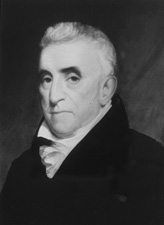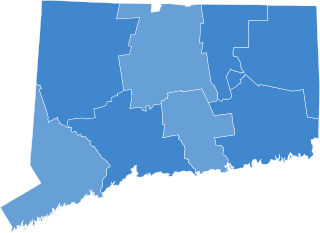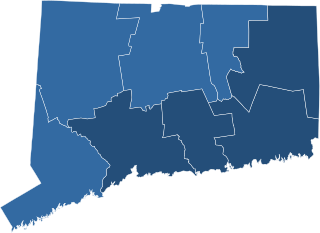
Oliver Wolcott Sr. was an American Founding Father and politician. He was a signer of the United States Declaration of Independence and the Articles of Confederation as a representative of Connecticut, and the nineteenth governor of Connecticut. Wolcott was a major general for the Connecticut militia in the Revolutionary War serving under George Washington.

David Daggett was a U.S. senator, mayor of New Haven, Connecticut, Judge of the Connecticut Supreme Court of Errors, and a founder of the Yale Law School. He helped block plans for the first college for African Americans in the United States and presided over the conviction of a woman running a boarding school for African Americans in violation of Connecticut's recently passed Black Law. He judged African Americans not to be citizens and supported their colonization to Africa.

Elizur Goodrich was an eighteenth-century American lawyer and politician from Connecticut. He served as a United States representative from Connecticut and Collector of Customs. He was also the brother of US Senator Chauncey Goodrich, son-in-law of Founding Father Oliver Wolcott.

Charles Polk Jr. was an American farmer and politician from Big Stone Beach, in Milford Hundred, Kent County, Delaware. He was a member of the Federalist Party, and later the Whig Party, who served in the Delaware General Assembly and twice as governor of Delaware.

Alexander Wolcott was a United States politician, customs inspector, and nominee to the Supreme Court of the United States. Nominated by James Madison in 1811, to replace the late William Cushing, he was rejected by the United States Senate by a vote of 9–24. He was later a delegate to the 1818 convention that drafted the Constitution of Connecticut.

Oliver Wolcott Jr. was an American politician and judge. He was the second United States Secretary of the Treasury, a judge of the United States Circuit Court for the Second Circuit, and the 24th Governor of Connecticut. His adult life began with working in Connecticut, followed by participating in the U.S. federal government in the Department of Treasury, before returning to Connecticut, where he spent his life before his death. Throughout his time in politics, Wolcott's political views shifted from Federalist, to Toleration, and finally Jacksonian. Oliver Wolcott Jr. is the son to Oliver Wolcott Sr., part of the Griswold-Wolcott family.
The Toleration Party, also known as the Toleration-Republican Party and later the American Party or American Toleration and Reform Party, was a political party that dominated the political life of Connecticut from 1817 to 1827. The American name referred not to nativism or the later Know Nothing, which was also known as the American Party, but to the party's national orientation.
Lucius Horatio Stockton was an American lawyer who served as U.S. Attorney for the District of New Jersey from 1798 to 1801. His rise to this position was relatively swift: he was admitted to the New Jersey bar in 1791; he became counsellor in 1794; and in April 1797, he was appointed sergeant-at-law.

The 1827 Connecticut gubernatorial election was held on April 12, 1827. Former congressman, speaker and Democratic-Republican candidate Gideon Tomlinson defeated incumbent governor and Democratic-Republican candidate Oliver Wolcott Jr., winning with 56.71% of the vote.

The 1825 Connecticut gubernatorial election was held on April 14, 1825. Incumbent governor and Toleration Party candidate Oliver Wolcott Jr. defeated Federalist Party candidates former senator David Daggett, former delegate Nathan Smith and former congressman Timothy Pitkin, winning with 68.82% of the vote.

The 1824 Connecticut gubernatorial election was held on April 8, 1824. Incumbent governor and Toleration Party candidate Oliver Wolcott Jr. defeated former congressman and Federalist Party candidate Timothy Pitkin, winning with 88.81% of the vote.

The 1823 Connecticut gubernatorial election was held on April 10, 1823. Incumbent governor and Toleration Party candidate Oliver Wolcott Jr. won re-election with 88.96% of the vote.

The 1822 Connecticut gubernatorial election was held on April 11, 1822. Incumbent governor and Toleration Party candidate Oliver Wolcott Jr. defeated former congressman and Federalist Party candidate Zephaniah Swift, winning with 86.59% of the vote.

The 1821 Connecticut gubernatorial election was held on April 12, 1821. Incumbent governor and Toleration Party candidate Oliver Wolcott Jr. was re-elected, winning with 86.91% of the vote.

The 1820 Connecticut gubernatorial election was held on April 13, 1820. Incumbent governor and Democratic-Republican Party candidate Oliver Wolcott Jr. was re-elected, defeating Federalist Party candidates former delegate Nathan Smith and former congressman and state legislator Timothy Pitkin with 76.14% of the vote.

The 1819 Connecticut gubernatorial election was held on April 8, 1819. Incumbent governor and Democratic-Republican Party candidate Oliver Wolcott Jr. was re-elected, winning with 86.85% of the vote.

The 1818 Connecticut gubernatorial election was held on April 9, 1818. Incumbent governor and Toleration Party candidate Oliver Wolcott Jr. was re-elected, defeating congressman and Federalist Party candidate Timothy Pitkin with 86.32% of the vote.

The 1826 Massachusetts gubernatorial election was held on April 3.

The 1817 Connecticut gubernatorial election was held on 10 April 1817 in order to elect the Governor of Connecticut. Incumbent Federalist Governor of Connecticut John Cotton Smith lost re-election against Democratic-Republican nominee and former United States Secretary of the Treasury Oliver Wolcott Jr.

The 1796 Connecticut gubernatorial election was held on 14 April 1796 in order to elect the Governor of Connecticut. Incumbent Federalist Party Acting Governor Oliver Wolcott won a plurality of the vote in his election bid against other candidates. However, as no candidate received a majority of the total votes cast as was required by Connecticut law, the election was forwarded to the Connecticut legislature, who chose Wolcott as governor.




















